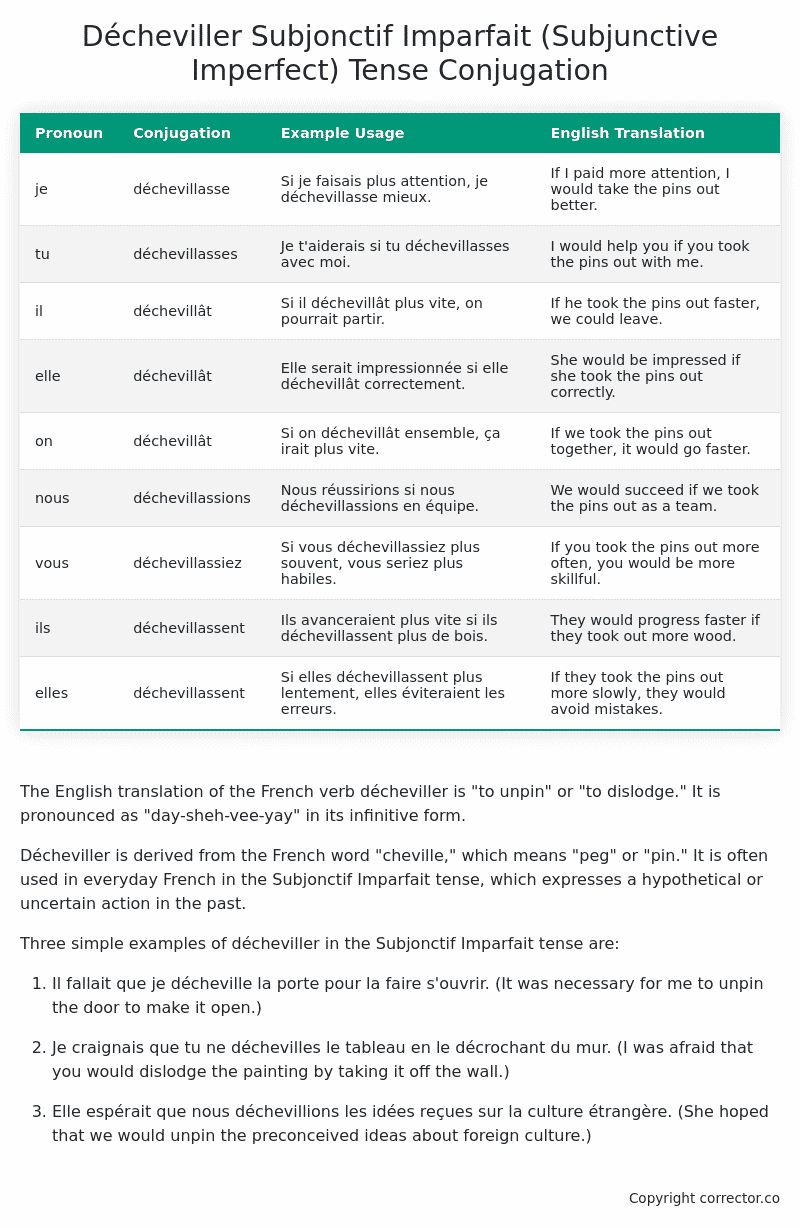Subjonctif Imparfait (Subjunctive Imperfect) Tense Conjugation of the French Verb décheviller
Introduction to the verb décheviller
The English translation of the French verb décheviller is “to unpin” or “to dislodge.” It is pronounced as “day-sheh-vee-yay” in its infinitive form.
Décheviller is derived from the French word “cheville,” which means “peg” or “pin.” It is often used in everyday French in the Subjonctif Imparfait tense, which expresses a hypothetical or uncertain action in the past.
Three simple examples of décheviller in the Subjonctif Imparfait tense are:
-
Il fallait que je décheville la porte pour la faire s’ouvrir. (It was necessary for me to unpin the door to make it open.)
-
Je craignais que tu ne déchevilles le tableau en le décrochant du mur. (I was afraid that you would dislodge the painting by taking it off the wall.)
-
Elle espérait que nous déchevillions les idées reçues sur la culture étrangère. (She hoped that we would unpin the preconceived ideas about foreign culture.)
Table of the Subjonctif Imparfait (Subjunctive Imperfect) Tense Conjugation of décheviller
| Pronoun | Conjugation | Example Usage | English Translation |
|---|---|---|---|
| je | déchevillasse | Si je faisais plus attention, je déchevillasse mieux. | If I paid more attention, I would take the pins out better. |
| tu | déchevillasses | Je t’aiderais si tu déchevillasses avec moi. | I would help you if you took the pins out with me. |
| il | déchevillât | Si il déchevillât plus vite, on pourrait partir. | If he took the pins out faster, we could leave. |
| elle | déchevillât | Elle serait impressionnée si elle déchevillât correctement. | She would be impressed if she took the pins out correctly. |
| on | déchevillât | Si on déchevillât ensemble, ça irait plus vite. | If we took the pins out together, it would go faster. |
| nous | déchevillassions | Nous réussirions si nous déchevillassions en équipe. | We would succeed if we took the pins out as a team. |
| vous | déchevillassiez | Si vous déchevillassiez plus souvent, vous seriez plus habiles. | If you took the pins out more often, you would be more skillful. |
| ils | déchevillassent | Ils avanceraient plus vite si ils déchevillassent plus de bois. | They would progress faster if they took out more wood. |
| elles | déchevillassent | Si elles déchevillassent plus lentement, elles éviteraient les erreurs. | If they took the pins out more slowly, they would avoid mistakes. |
Other Conjugations for Décheviller.
Le Present (Present Tense) Conjugation of the French Verb décheviller
Imparfait (Imperfect) Tense Conjugation of the French Verb décheviller
Passé Simple (Simple Past) Tense Conjugation of the French Verb décheviller
Passé Composé (Present Perfect) Tense Conjugation of the French Verb décheviller
Futur Simple (Simple Future) Tense Conjugation of the French Verb décheviller
Futur Proche (Near Future) Tense Conjugation of the French Verb décheviller
Plus-que-parfait (Pluperfect) Tense Conjugation of the French Verb décheviller
Passé Antérieur (Past Anterior) Tense Conjugation of the French Verb décheviller
Futur Antérieur (Future Anterior) Tense Conjugation of the French Verb décheviller
Subjonctif Présent (Subjunctive Present) Tense Conjugation of the French Verb décheviller
Subjonctif Passé (Subjunctive Past) Tense Conjugation of the French Verb décheviller
Subjonctif Imparfait (Subjunctive Imperfect) Tense Conjugation of the French Verb décheviller (this article)
Conditionnel Présent (Conditional Present) Tense Conjugation of the French Verb décheviller
Conditionnel Passé (Conditional Past) Tense Conjugation of the French Verb décheviller
L’impératif Présent (Imperative Present) Tense Conjugation of the French Verb décheviller
L’infinitif Présent (Infinitive Present) Tense Conjugation of the French Verb décheviller
Struggling with French verbs or the language in general? Why not use our free French Grammar Checker – no registration required!
Get a FREE Download Study Sheet of this Conjugation 🔥
Simply right click the image below, click “save image” and get your free reference for the décheviller Subjonctif Imparfait tense conjugation!

Décheviller – About the French Subjonctif Imparfait (Subjunctive Imperfect) Tense
Formation
Common Everyday Usage Patterns
Interactions with Other Tenses
Subjonctif Présent
Indicatif Passé Composé
Conditional
Conditional Perfect
Summary
I hope you enjoyed this article on the verb décheviller. Still in a learning mood? Check out another TOTALLY random French verb conjugation!


